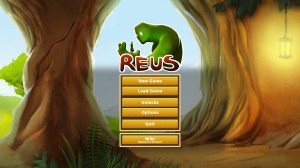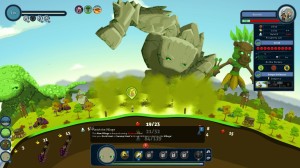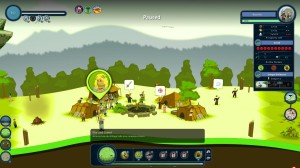I was one of the unfortunate souls that never had a chance to try “Black & White”, a god-game developed for the PC and Mac platforms soon after the turn of the century. The idea of being a god or controlling a set of gods to reign prosperity and/or terror among my subjects has always been sadistically appealing. I spent a ton of time with “Populous” back in the day doing exactly that, though I’m glad to see that more games are popping up as of late that focus on this particular genre. “Reus” will task the player with creating a set of giants, each with unique abilities, with the goal of seeing to the well-being of the humans that rise up and settle on your planet. Before we get started taking a look at this game in further detail, I’d like to thank Manuel Kerssemakers from Abbey Games for providing me with a free review copy.
The main menu allows the player to start a new game, continue an existing one, adjust game options, and view what they’ve unlocked thus far. The options menu is a fairly basic one, but covers everything necessary to customize your experience. You can adjust things like screen resolution and audio sliders while being able to toggle fullscreen, hints, and other graphics settings. Starting a new game allows you to play the tutorial (three mini-levels), try your hand in era mode, or have at it in free play. Era mode and free play mode are the same, except that the former is timed and allows you to unlock different things as you play. Free play mode isn’t timed, but you won’t be able to progress and unlock new content. I do like the addition of free play mode, as it allows you to try out what you’ve unlocked thus far without worrying about time limits. The era mode, on the other hand, will force you to be quick and efficient.
There are four giants at work that serve as the gods that you’ll be controlling. Each can do a number of things, but seem to revolve around a particular theme. The swamp giant, for example, can create swamps and lay down herbs that will provide technology to a nearby village. The crab giant, on the other hand, is great for providing food and creating ocean biomes. The rock giant can create mountains and lay down minerals that improves the wealth of the land, while the tree giant can lay down forests with ease and plant bushes. This is but a small taste of their abilities, as each one has a little over a half a dozen options available to them. Their abilities are primarily used to help life flourish, but can be used in an offensive way to quell villages that have gone mad with greed.
While being an obvious fit for the god-game genre, “Reus” comes across (to me anyway) as a puzzle game. You’ll start off small with not very many abilities and resources available to you, but that will soon change as you complete developments. Think of developments as objectives or goals that unlock new toys for you to play around with. In order to complete these developments, you’ll need to be efficient and make use of the abilities you currently have in the time alloted, hence where the puzzle bit comes into play. Some resources compliment each other (called symbiosis) and some giant abilities can be combined to make new resources/biomes available for your use. It’s all about experimenting with your giants and seeing what works and what doesn’t, something that appeals to me greatly.
The interface is fairly easy to read, once you get used to all of the information it throws at you. You can click on giants and control them in an RTS fashion, though everything occurs in 2D. Using your arrow keys or the mouse, you can zoom in and out or rotate your view of the planet left or right. Clicking on a giant opens up an action bar along the bottom, which can be utilized to interact with the planet and its inhabitants. Clicking on a patch of land allows you to see its biome and current status, based on what you may have put there. Villages, once they have been formed, are a bit more complex. Clicking on them will provide you with a ton of information off to the right side of the screen, where you’ll be able to see their food, wealth, and tech “income”, based on the resources you’ve provided within their range. Growing a village faster than it should will result it in becoming greedy and possibly starting wars. Villages will grow on their own given time, completing projects and spawning ambassadors that grant your giants more options.
The game is easy to play, but deceptively complex once you get past the learning curve. It’s not complex to the point of it being unplayable, but it will make you try out different combinations to see what makes the game tick. Your first few games will no doubt be stagnant as you stumble around, trying to get your feet wet with all of the different abilities available to you. Once you learn the ropes and discover new things, you’ll find options you hadn’t considered before, opening up the gameplay in all new ways. As such, “Reus” is an incredibly fun and addicting game that rewards those who are willing to learn and grow along with it. The wide range of unlocks available and the addition of a free play mode provides a ton of replayability, allowing one to get sucked in for hours if they let it happen. For ten bucks (as of 5/18/13), you can’t go wrong with this little gem.
Final Verdict: 9/10
—
You can learn more about and purchase “Reus” by visiting the following websites:
http://store.steampowered.com/app/222730/
http://www.desura.com/games/reus
You can check out gameplay videos here:
http://www.youtube.com/watch?v=Idqh58rEPSs
http://www.youtube.com/watch?v=laM2L65PGOk



